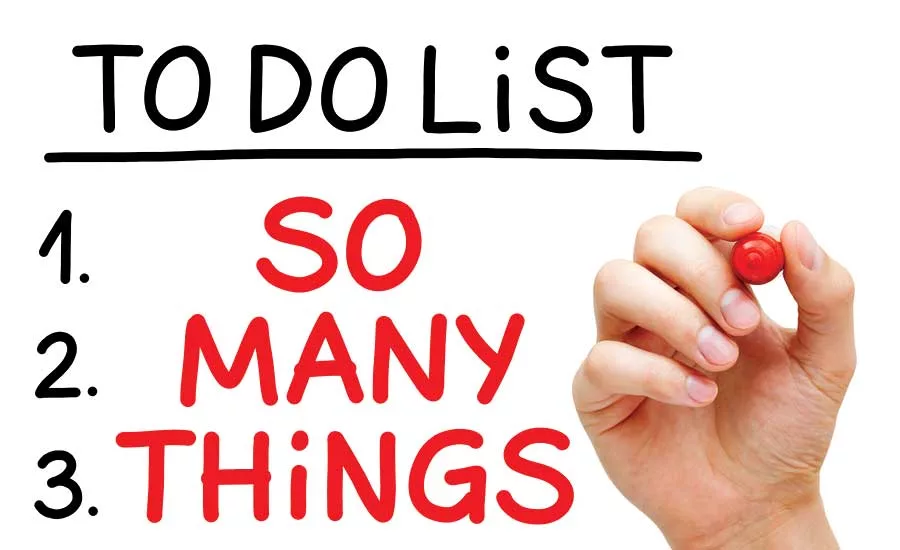You’re never too busy to lead your team

Too often during some of our more profitable and productive times of year, I start to hear the “too busy” excuse from some of my clients. “I’m too busy to train right now,” or “I’m just going to wait until things slow down to focus on that,” or “I’ll think about that later.” Paired with a strengthening economy in most markets, progressive in-home service contractors can be very busy at times.
Don’t get me wrong — being busy is an extremely good thing overall, but it also comes with its own set of issues. You might be wondering how being busy can possibly have a negative connotation, but if you aren’t paying attention to the right things when you’re busy, they can catch you off guard later. Here’s what I mean.
Being busy hides problems
When it looks like things are going great, you can get so caught up fighting fires and dealing with miniscule details that even when it appears everything is going well, you could be missing inefficiencies that are costing you a great deal of money.
Maybe your technicians and salespeople are getting a little sloppy with following your processes so conversion rates are suffering. If nobody’s paying close attention because you’re “busy,” those lower conversions will come back to haunt you when your phone starts ringing less.
We live in a supply-and-demand industry, and the challenge we face season to season is that many of us get busy — and then slower — based on weather, time of year and other external factors. Most in-home service companies don’t keep playing offense when it’s busy. Instead, they shift into “task mode” rather than focusing on the usual delivery of high-quality customer service. Immediately, their value proposition takes a nosedive — along with conversion rates.
Profit hides problems
When a business is profitable, people tend to worry about numbers less, and this is exactly when issues can arise for many companies. If you are focusing solely on profitability or sales, customer service can suffer, your culture can suffer, and your long-term results can suffer.
There are so many aspects of running your company, I know you can feel like a cat chasing a laser sometimes, but it’s a matter of prioritizing and systematizing. This is where systems and reporting can be a huge help, especially during the busier times.
e availability factor even more relevant to disproportionally larger inventories.
It can be as simple as a Daily Focus Scorecard, weekly meetings with reporting, group text threads for communication and more. Regardless how you communicate, when you are busy, you must communicate with both your team and clients twice as diligently as when it’s steady and “easy” to manage.
Management hides problems
We all want to have faith in our top leaders, but they need to be held accountable, too. You need to make sure you have a finger on the pulse on what’s going on with your company instead of just taking leadership’s word for it. The biggest reason companies fail is because of poor leadership.
The second biggest reason companies fail is poor management. There is also a very distinct difference between these two capabilities. While I won’t get into those differences right now, I want to focus on your own company management. Where does your company need more attention from management? What is management focused on when it’s busy? What reporting strategies and systems do you have in place to support management when it’s really busy to make sure you deliver on core values, uphold position agreements and demonstrate the highest level of service possible?
In addition, the term “management” has a lot of different meanings. Whether we’re talking sales management, service management, operations management, inventory management or whatever other type of management you have in your company, we must address the core challenge, which is what we manage, who we manage, and how we manage people and projects.
Ask yourself these questions: Who and what are you managing? Do you have extreme clarity when it comes to the specific Key Performance Indicators (KPIs) you are managing by? Do you manage tasks? Do you manage information? Do you manage time?
Most managers we see don’t truly manage systems or people — they manage stress and chaos. The flame that burns the hottest gets the most attention, right? That shouldn’t be the case when it comes to successfully (and enjoyably) having a seamless and efficient operation. You should always maintain a sense of consistency, no matter how slow or busy things feel.
Believe it or not, team members enjoy a sense of consistency, stability, and understanding what is expected of them in the workplace. This is why setting and posting goals is so important. This is why consistent training is so important. This is why meetings (being held at the same day and time) are so important. It sets the tone for your company. If you want consistent, stable growth throughout the year, your standards and expectations can’t be compromised simply because you get distracted and overwhelmed.
Also keep in mind that people want to be led, and need to be held accountable. You can set a great example, and really be committed to growing people and the company, but if you don’t have a system for holding people accountable, even the best manager can fail.
Stick to the plan
You see, if you have a system to support your efforts, it doesn’t matter if you are busy or slow because you can effectively manage what’s happening in the company, regardless of the present circumstance. You need a system for dealing with customer issues, a system for payment processing and tracking, a system for team member reviews, a system for training, a system for taking calls — you get the idea. You can only manage what you can track, so, if you don’t have systems for tracking anything, how can you manage all aspects of the company and be a great leader?
This is why most companies are ruined when it’s busy — the issues don’t show up and reveal negative consequence until things “settle down” and things “get back to normal,” or slow down. The lack of systems and tracking make it nearly impossible to really know what’s going on, so you can’t effectively manage or truly lead when you’re busy.
Many managers are effective. Many styles are effective. Many people are effective. And they all have different styles when achieving success. How you go about communication, education, and coaching makes all the difference when it comes to being able to impact people and results in your organization.
I personally believe the best managers have the highest levels of self-awareness. Regardless of your position in the business’ hierarchy, how well do you manage yourself? How effectively do you manage your own time? Are you on time or late to meetings? Are you at a “zero inbox”? As we grow managers in our own organizations, we must remember that the most important leader or manager we can ever grow is looking at us in the mirror.
If you want to be a better leader, commit time, commit to training, commit to accountability, commit to systematizing and commit to managing the things that really impact your business. Your results will improve, period.
Looking for a reprint of this article?
From high-res PDFs to custom plaques, order your copy today!




